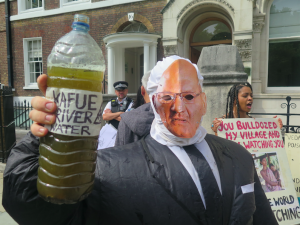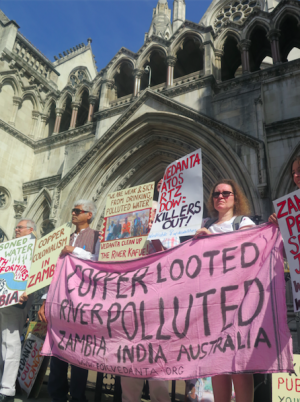 13th October 2017. Judges today threw out Vedanta’s appeal to the May 2016 High Court judgment allowing Zambian farmers to have their case against the company heard in the UK. The judgment adds further weight to precedents holding UK companies legally responsible for the actions of their subsidiaries.
13th October 2017. Judges today threw out Vedanta’s appeal to the May 2016 High Court judgment allowing Zambian farmers to have their case against the company heard in the UK. The judgment adds further weight to precedents holding UK companies legally responsible for the actions of their subsidiaries.
Judges today released their verdict on Vedanta’s appeal in the case of the Chingola communities suing UK company Vedanta Resources, and their Zambian subsidiary Konkola Copper Mines (KCM), for pollution causing illness and loss of livelihood.
Press coverage: New York Times – Zambian Villagers Win Right to Sue Vedanta in English Courts
Newsclick – Zambian villagers can now sue Vedanta in England over poisoning their water.
Legal analysis at Lexology.com – Jurisdiction and parent company liability – Court of Appeal keeps door ajar for extra-territorial human rights related claims
The three appeal judges Lord Justice Simon, Lord Justice Jackson and Lady Justice Asplin threw out Vedanta’s appeal in the case of Dominic Liswaniso Lungowe vs Vedanta Resources and Konkola Copper Mines, agreeing with the High Court verdict that it is arguable that it breached the duty of care owes to the claimants polluted by its Zambian subsidiary, and that the case against it has merit. The judgment states:
“Mr Gibson also pointed out that there had been no reported case in which a parent company had been held to owe a duty of care to a person affected by the operation of a subsidiary. That may be true, but it does not render such a claim unarguable. If it were otherwise the law would never change”.
They also agreed with the high court judge that England is the proper place to try both KCM and Vedanta, especially considering issues with lack of access to justice in Zambia. Vedanta is unlikely to appeal such a strong judgment to the Supreme Court, and the trial can now be heard in the UK.
 Protests were held outside the Court of Appeal during the hearing in July. A detailed report of the hearing can be found on our website.
Protests were held outside the Court of Appeal during the hearing in July. A detailed report of the hearing can be found on our website.
The ruling helps pave the way for other London-listed multinationals to be held liable in the English courts for the actions of their subsidiaries abroad.
The judgment is being celebrated by the affected communities who have fought an eleven year legal battle against the company for continuous pollution of their water sources since it took over KCM in 2004. Communities first took KCM to court in Zambia in 2006 when the River Kafue which they depend on for drinking, bathing, cooking and irrigation was severely polluted by the company. They were awarded a landmark $2 million fine in 2011 in the Zambian High Court, but KCM appealed, and in 2015 the Supreme Court upheld the guilty verdict but removed all compensation. As a result the victims took their case to UK lawyers. In the 2016 High Court judgment Justice Coulson stated that KCM and parent company Vedanta had attempted to pervert the course of justice in Zambia, and claimed KCM could even declare insolvency in Zambia to avoid paying victims, noting the company’s financial secrecy and historic dishonesty.
Recent news coverage has detailed the ongoing pollution, sickness and poverty suffered by the affected communities. Headmen of the affected communities recently issued these demands which were announced to the Vedanta board at its August AGM by a dissident shareholder:
1 Stop polluting the rivers immediately. Close down the plant until pollution control measures are replaced and upgraded.
2 Provide clean water to the villages immediately, by tankers or pipes.
3 De-silt the Mushishima stream and Kafue River and remove contaminated waste.
4 Remediate the entire polluted area to make it safe to live, farm and fish there again.
5 Compensate the affected people for loss of health and livelihood. All medical costs should be paid by KCM/Vedanta in future.
Further analysis from Foil Vedanta:
The decision in (1) Vedanta Resources Plc (2) Konkola Copper Mines Plc versus Dominic Liswaniso Lungowe and others [2017] EWCA Civ 1528 is one of three cases which are being heard by the Court of Appeal on the issue of whether, and in what circumstances, the English Court may have jurisdiction to hear a case involving a tort committed overseas. In the present case, it was accepted that if the claimants claimed just against Konkola Cooper Mines (KCM) that the proper place for the trial would be Zambia where it could be held strictly liable under Zambian law for its breaches of duty and where the trial proceedings could be far more easily conducted. However, the claimants argued that that there was at least an arguable case against Vedanta Plc, that EU law allowed a claim to proceed against it in the UK, that because an arguable claim could be brought against Vedanta Plc and because of the barriers and that no substantive justice could be done for the Claimants in Zambia the claim should be allowed to proceed in the UK.
.
The Court of Appeal breaking down those claims, in the light of the findings of the lower Court, found that there would was at least an arguable case against Vedanta PLC under the applicable Zambian law, that it has breached its duty of care to the claimants and that the ECJ case of Owusu v Jackson allowed the claim to be brought in the UK. It found that there was no arguable error in the lower Courts findings that, if Vedanta PLC could be sued in the UK then the UK was the most appropriate forum for the claim, that KCM could be properly added as a defendant because there was clearly an issue to be tried against both defendants and that the claimants would not obtain substantive justice in Zambia.
.
The judgement is clearly to be welcomed, allowing as it does, other possible claims to be brought against parent companies in the UK on the basis that they had assumed responsibility, had superior knowledge on which the subsidiary relied or otherwise owed a duty of care to the claimants., where the claimants would not obtain substantive justice in their home country. However, with the proviso outlined by the Court that: “There must come a time when access to justice in this type of case will not be achieved by exporting cases, but by the availability of local lawyers, experts, and sufficient funding to enable the cases to be tried locally”.